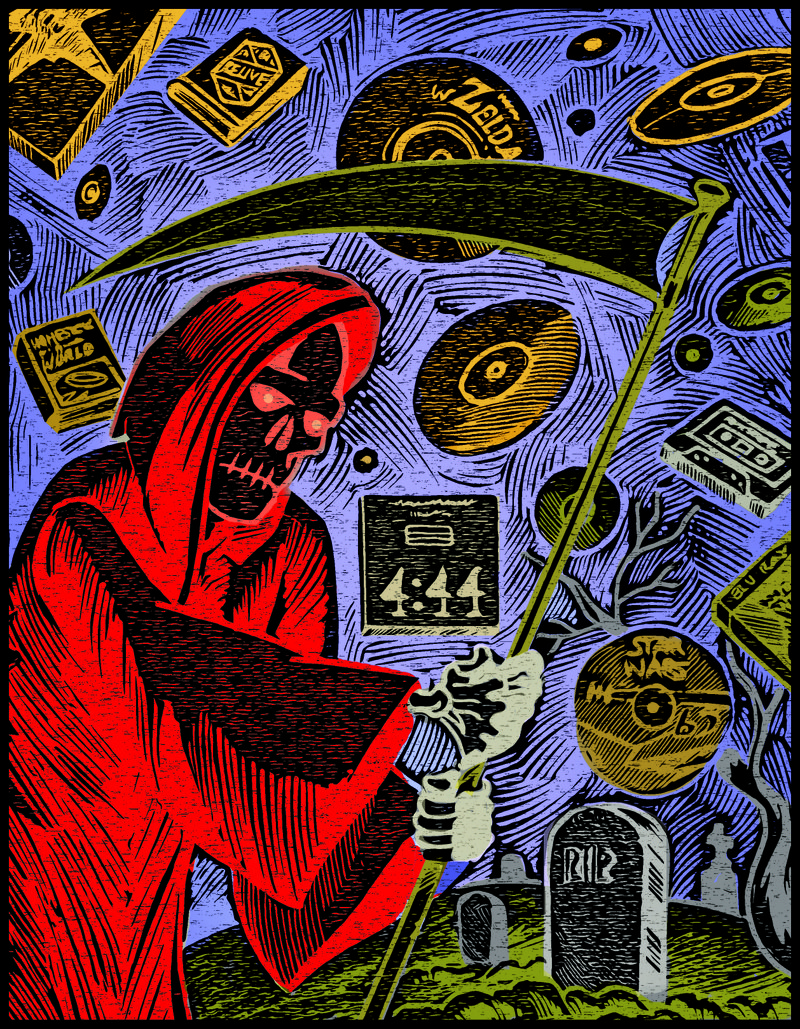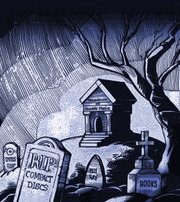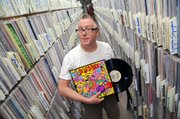If you still think of CDs and DVDs as the default delivery system for digital entertainment products consider this: It has become almost impossible to get a CD player in a new car.
It's a reflection of a shift in the delivery of entertainment: As streaming audio and video soar in popularity, sales of CDs and DVDs are plunging.
My 2015 Mini Cooper with a premium Harmon Kardon sound system doesn't have a CD player; I didn't notice until after I got it home that it didn't have a slit to receive a shimmy disc. It did come with satellite radio, a USB slot and an auxiliary jack which would allow me to hook up an iPod, my phone or a portable CD player if that's what I wanted to do. Maybe you can fit a Bluetooth transmitter to a boom box and pair it with your car stereo. There's always a workaround if you're nerdy enough.
But most of us aren't. Technology is banal magic -- we need never imagine how a thing works. We just assume that it does and are annoyed when it doesn't. We quickly become jaded after experiencing some new miracle; it doesn't take long to move from marveling at a new innovation's advances to grumbling about the unconscionable 30 seconds or so it takes for a 4K UHD DVD to load.
We could put in an aftermarket CD player, but
won't. It's less convenient than accepting the factory option, and streaming services like Spotify give access to almost anything we want. You don't need a physical copy of Creedence Clearwater Revival's Greatest Hits anymore; anytime you want to hear "Lodi" or "Travelin' Band" you can pull them out of the ether.
And the automobile companies need that dashboard real estate so they can install screens that display navigation programs and vehicle information along with streaming-music and other apps. (I wish my Mini had a touch screen.)
But a lot of us have a lot invested in our compact disc collections. At one point, I had more than 13,000 discs. To accommodate the CDs, I took most out of their jewel cases, slipped them in thin paper sleeves and filed them in a rack system that was about eight feet high and 14 feet long.
All that and more fits on a hard drive that's about the size of a paperback dictionary. The four-terabyte hard drive that holds my music collection (a full year of music, according to the iTunes application) is only a little more than a quarter full. I have a copy on a backup disc. So last year I gave away the CDs.
It wasn't easy psychologically, for I grew up in a materialistic age. In high school I had a basketball coach whose den was lined with records by the likes of Stan Getz and Bix Beiderbecke; he played them on a Thorens TD-160 turntable powered by a McIntosh 1900 through Acoustic Research AR3a speakers. I determined that when I grew up I would own a similar hi-fi setup. (I already had a burgeoning record collection.)
I wanted my walls insulated by records; I wanted a high-end component stereo system. I also wanted bookcases tight with books. It was part of my vision of genuine adulthood, having a library of music (arranged, as Eddie Simmons did in Diner, alphabetically by artist and chronologically by release date) at my fingertips.
I believed (and still believe) that there are clues to a person's character in the things they collect and the things they let go. Whenever I'm in someone else's house I study the spines of their books, if they have them. I browse their music collection. Salesmen used to note the shoes and watches of their potential clients; I assay their cultural consumption.
I never got the super-expensive stereo; I made do with Pioneer and Technics gear, but the record collection grew to the point it became debilitating. You can only move 40 crates of vinyl so many times, and in 1989 when I needed money I sold the bulk of my record collection to Bill Eginton at Arkansas Record-CD Exchange in North Little Rock. I went all in on CDs.
Until I quit them last year.
. . .
I'm not the only one. Compact disc sales fell 18.5 percent in the United States last year. In 2001, the peak year for CD sales, more than 800 million CDs were sold in the United States. Last year that dropped to around 89 million.
If you have been in Barnes & Noble or Best Buy lately, you have probably noticed the sections of the store dedicated to selling CDs and DVDs have shrunk considerably. Best Buy, once the biggest music reseller in the United States, has told suppliers that it will remove music CDs from its physical stores as of July 1. According to Billboard, Target is trying to negotiate with music distributors to sell CDs on a consignment model. (Some are reportedly balking, which means Target may not carry their product at all.)
All the big-box record store chains -- Tower and Virgin Megastores -- have disappeared. Hastings Entertainment closed its Conway shop (and 122 other locations) in 2016.
Even digital downloads are down; when the Recording Industry Association of America released its annual year-end revenue report recently, it showed that revenue from digital downloads had dropped 25 percent to $1.3 billion over the previous year. By contrast, revenue from physical products fell just 4 percent to $1.5 billion.
It's obvious that a lot of people no longer care about having a physical talisman to remind them of the entertainment at their disposal -- it's enough for them to stream it. They're content with buying licenses that allow use of the product. When everyone has access to virtually everything, there's no status to be had by displaying a collection, is there?
Yet there are people who still dig through the crates in stores like Little Rock's Been-Around Records or Arkansas Record-CD Exchange. The resurgence of vinyl records as a cultural signifier -- as a hip obsession -- is one factor in the continued viability of these outlets, but it's probably a smaller one than you might think. Reade Mitchell, who manages Arkansas Record-CD Exchange, points out that the store sells nearly as many CDs as it does vinyl records now, and that despite the popular perception of the shop as a used record store, most of what they sell is new product.
"Most of the vinyl we sell now also comes with download cards," Mitchell says. It's not that different from the '80s, when some of us would buy an album and immediately record it on cassette. Maybe the vinyl doesn't get played at all these days.
There are a lot of vinyl aficionados who would argue that the quality of the sound is better. It's surprising that some of the Record-CD Exchange customers argue for the superior quality of CDs, though when they were first introduced record companies insisted CDs sounded better, a verdict rejected by a lot of listeners. My experience is that it depends -- digitally recorded and mastered music can sound better than that captured via analog methods, but part of what we enjoy about pop music is the microtonal imperfections and distortions that seep into performances and recording. Vinyl can -- and usually does -- sound "warmer" than digital media, but whether that's preferable is a matter of taste.
Most of Mitchell's customers want to own and control their music; they perceive something provisional in the contract between the streamers and themselves. Another big part might be the joy available from the browsing experience. There's something thrilling about finding a lost gem in a record store -- dialing it up from the internet is not the same. Physical browsing offers occasion for serendipitous discovery; in a store, you often find exactly what you weren't looking for.
In the 1980s and '90s, one of the first things we'd do when we visited a large city (or even a medium-size town) was hit the record stores, where we were sure to find things that weren't available in local shops. I remember making significant purchases in Tower Records stores on Los Angeles' Sunset Strip and in New Orleans' French Quarter; there was a trip to London where we spent three hours rummaging through the HMV shop on Oxford Street.
. . .
Maybe it's nostalgia.
I don't imagine that a lot of people born in the 21st century will have the same sort of attachment to the same sort of things that baby boomers had; in many ways it's insensible to care so much about pop culture artifacts such as muscle cars and record jackets. These things are acquired tastes, expensive and esoteric. A few will collect CDs, just as a few people now collect 8-track tapes or 78 rpm shellac records.
Movies on DVD are likely to last longer than pop music on CD, if only because they take up more digital space, and it might be handier to collect ancillary material such as making-of featurettes and alternate audio tracks on a disc. As someone who shows movies to classes, I can't see any advantage to streaming the films yet, although more and more that's how I consume them. More to the point, it's how movie studios are often making their movies available to critics.
They're training us to be platform neutral, which seems a dubious long-term strategy. If I become comfortable watching movies on my iPad, why do I have an incentive to see them in a theater? I know there are advantages to watching a film in the context of an audience -- in the company of interested strangers in a purpose-built temple -- but I have been watching movies for six decades. If you grow up with a 7-inch screen before your face you might feel differently.
Netflix and Amazon and other streaming services have disrupted the traditional movie industry, which is becoming more and more reliant on safe -- though expensive -- retreads of ideas that worked a decade or so before. Superhero films, sequels and remakes make up the bulk of Hollywood product now, and they cycle through theaters and onto home video quickly. Almost every movie nominated for this year's best picture Oscar is now available on DVD or for streaming -- it used to take a movie at least two years before having any sort of television debut. It's common to have films come out "on demand" online the same day they open in theaters; a lot of movies never even seek a theatrical release.
. . .
Books will likely have the longest tail, in part because there are so many of them and there are some real problems associated with constantly reading off a screen. But I wonder about that too, as I've heard it suggests that literacy itself is an old-fashioned notion and in the future human beings might find richer ways to communicate than through freighted words. Our expectations tend to limit us, and recent events suggest that old ways of thinking about expertise and education might not survive. Some day books might serve as literal rather than intellectual fuel. Someday we might transmit all we read through an E.T. fingertip touch.
My next car will probably not have a CD player -- unless I go old-school and buy a used truck -- but it probably will be able to pull down just about any song I request. And that's a problem in and of itself, for left to its own devices my brain trots along familiar paths. I'm like an old blues guitarist finding familiar shapes with his fretting hand; they feel right and comfortable and maybe even haunted, but I'm limited by knowledge and imagination. When we used to take car trips, I'd always throw in a few CDs I hadn't heard for a while, and something brand new.
I will always remember riding back from Memphis on a Saturday morning hearing James McMurtry's Complicated Game for the first time. I remember playing a three-disc Richard Thompson anthology all the way back from New Orleans in 1994. I remember a bad night when Robert Johnson's "Love in Vain" played over and over on repeat.
When you have virtually everything, nothing is precious, nothing feels real. At least not to those who grew up in a specific time and place -- in a material world.
I don't mind saying, I'm going to miss things.
Email:
pmartin@arkansasonline.com
blooddirtangels.com
Style on 04/01/2018



